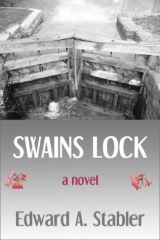
Текст книги "Swains Lock"
Автор книги: Edward A. Stabler
Жанры:
Триллеры
,сообщить о нарушении
Текущая страница: 19 (всего у книги 25 страниц)
Chapter 29
Edwards Ferry
Wednesday, August 28, 1996
The following afternoon Vin stood on a dirt ramp that led from the towpath to the river, examining a display sign that offered historical perspective on Edwards Ferry.
An Ideal Crossing
The Potomac River is calm and narrow here, making it an ideal location for a ferry crossing. In 1791 Edwards Ferry began to operate here, connecting Maryland farmers to the Goose Creek Canal in Virginia and to Leesburg markets. The ferry closed in 1836 but the community that grew around it continued, carrying on the name. Over time, a general store, a warehouse, and 36 residents composed the Edwards Ferry community. With the coming of the C&O Canal the small village prospered from the increase in commerce.
The text was arrayed above two old images of Edwards Ferry. The uppermost was an illustration of foot soldiers and horse-drawn caissons marching down a broad dirt avenue and passing a cluster of houses on their way to the river, visible in the distance beyond. The caption read “General Stone’s Division at Edwards Ferry” and the sign elaborated:
During the Civil War, Edwards Ferry connected Union Maryland with Confederate Virginia. Harper’s Weekly depicted Union troops passing through Edwards Ferry in October 1861. Many troops and supplies from both sides crossed the river here throughout the war.
The Harper’s Weekly illustration was superimposed on an enlarged photograph from the early 1900s, taken from the vantage point Vin occupied now. It showed leafless trees flanking a deserted path leading down to a wooden boat ramp. Presiding over the path was a brick building with tall windows on both stories. Vin looked at the gutted shell to his left. All that remained now were its side walls and a portion of the back wall. The sign explained its fate.
The crumbling Jarboe’s Store remains here today. It was a general store and post office operated by Eugene E. Jarboe in the late 19th and early 20th centuries. Flood damage forced the National Park Service to partially tear down the unstable structure.
He opened the book in his hand to the bookmark he’d inserted an hour ago at the library. Author Wesley Vieira provided a more detailed account of the proprietors and times of Jarboe’s Store, but from Vin’s perspective those times ended too soon. After the ferry stopped running in 1836, Jarboe’s relied on the canal for both customers and supplies. Diminishing canal traffic undermined the store, and Jarboe’s closed in 1906.
It was a passing reference Vieira made to a denizen of Edwards Ferry during the last decade of canal operations that caught Vin’s attention at the library.
Emmert “M-Street” Reed tended Lock 25 at Edwards Ferry from 1913 until the canal’s demise in 1924. To help fill the void left by Jarboe’s, Reed built a smokehouse and sold smoked pork and turtle to boatmen and local residents. Reed’s nickname reportedly derived from his affinity as a younger man for the Georgetown taverns at the terminus of the canal. During Prohibition, rumors held that thirsty boatmen could sidestep the law and purchase pints of moonshine whiskey from Reed while transiting Lock 25.
A penciled arc extended from the space between the words “Reed” and “tended” in the first line. The arc curved to an annotation in the right margin that read “and his albino mule?”, and was written in a woman’s hand that he’d seen before – in the Kytle book, on his trip to the library last fall. He had smiled grimly while connecting the dots. His encounter with Kelsey Ainge at the New Year’s party, with her disingenuous comment about joined sycamores. The words he’d found under the snow, etched into the railings that joined the sycamores at Carderock. “Killers.” “Dead.” “Why are you here?” The visit to her studio with Nicky, when he’d seen the photo of the mason’s mark on her wall. And the little crosses planted on top of the stop-gate at Bear Island, directly above the mark. Then yesterday’s message from the library in a voice that sounded familiar. And now this handwritten reference to Emmert Reed’s albino mule. She was playing a cryptic game with him using excerpts from Lee Fisher’s note. The game had lost its momentum during his illness, but now it seemed to be starting again.
There was no other mention of Emmert Reed in Vieira’s book, but after reading the annotated passage, Vin had been unable to leave the book behind at the library and abandon Lee Fisher’s puzzle and Kelsey Ainge’s game for good. Though he had been drifting toward obsession last winter, he’d started swimming toward shore when his fever broke. Each stroke represented forward progress on his Rottweiler project or the wedding plans and pulled him closer to the limen. But now with one foot on terra firma and one in the water, he felt he was falling back in. He had checked the book out at the circulation desk and headed home.
And driving out River Road from Potomac, he found himself passing the turn for Ridge Line Court. Then passing Pennyfield Lock Road. And Seneca Road, three miles beyond, after which River Road turned to gravel and zigzagged through seemingly-deserted sod farms before ending at an unmarked intersection with a forgettable county lane. Two more miles brought him to Edwards Ferry Road, which led through tangled trees to the canal. There was an unpaved parking area, a wooden bridge across the lock, and the dirt path down to the river. This setting must have been known well by Emmert Reed’s albino mule. As he approached the bridge, he’d scouted the nearby trees for sycamores joined at the base.
***
He closed Vieira’s book and climbed the dirt incline toward the towpath. The lockhouse stood boarded up to his left, flanked on three sides by lush grass. He detoured onto the back lawn. The two upper stories were whitewashed bricks but the foundation was made of rough-hewn stone from which the paint had worn away. Because the house was built on a downslope from the towpath, the rear half of this foundation was above ground. It featured generous windows and two doors, all boarded up with green-painted wooden partitions that were screwed into the frames. He circled to the far side of the house and climbed the grassy pitch to the towpath. The front door and windows were sealed the same way.
He looked up and down the towpath and saw no one. On a weekday one or two cyclists, joggers or birdwatchers might pass Edwards Ferry on the towpath every few hours, but the site was far enough from major roads that it received a small fraction of the traffic that swarmed over the towpath every day around Great Falls.
Feeling a stab of dejection, he returned to his car. What had he expected to find here? A plaque next to the lockhouse detailing the exploits of famous locktender Emmert Reed? Unless his memoirs were stashed somewhere inside the lockhouse, old M-Street had left no trace of his tenure at Edwards Ferry. Grasping at straws, Vin decided to drive home through Poolesville, the closest real town on the Maryland side of the river. Vieira’s book mentioned that Charlie Poole had tended lock and managed Jarboe’s store in the years before Emmert’s tenure at Lock 25, so Vin guessed that old M-Street Reed might also be a local product. If he’d lived in Poolesville while not tending lock, maybe his grandchildren lived there today.
At the Poolesville post office he thumbed the community phone book and found listings for Ben Reed, D Reed, and Thomas H. Reed. He copied the names and numbers into a spiral notepad he kept in the car and drove back toward Potomac.
It was almost five by the time he got home and he had no enthusiasm for diving into the Rottweiler project as he stood and tapped a finger on his desk. Nicky wouldn’t be home for at least half an hour, so… he jogged upstairs, retrieved the cordless phone and a cluster of red grapes, and settled on the living room couch. From his pocket he pulled the notepad. The first number was for Ben Reed. He waited for the answering machine, then spoke deliberately but cheerfully into the handset.
“Hi, Ben. This is Vin Illick calling. I’m researching an article for the Maryland Historical Society about the last decade of commerce on the C&O Canal. I’m interested in a man named Emmert Reed who worked as a locktender at Edwards Ferry in the early 1920s. If you or anyone you know has any information about him, I’d love to talk to you.” He thanked Ben and left his work phone number, then ate a few grapes and studied the second name. D. Reed – a woman? He dialed and again reached a recording, this time in Diane Reed’s voice. He left the same message he’d left for Ben.
On the next call he was startled to hear the voice of a live person. Thomas Reed confirmed his identity with a raspy, unmodulated voice that gave Vin hope he might be over sixty – maybe old enough to be Emmert Reed’s grandson. But after Vin recited his pitch, Thomas responded abruptly. “There’s no Emmert Reed around here.”
“Well,” Vin said deferentially, “the man I’m researching worked as a locktender in 1913. So I’m actually hoping to talk to one of his relatives. Perhaps a grandson or a great niece.”
“You won’t find one in Poolesville. I was born and raised here and I know every Reed in town. For four generations. I never heard of an Emmert Reed.”
“Some people may have known him as M-Street Reed.”
The old man paused. “Did you say M-Street? What the hell kind of name is that?”
“It was just a nickname… from his canal days.” Vin’s confident tone wavered as the doubt he’d felt at Edwards Ferry resurfaced.
“You want information about the canal days, maybe you should go to the library and ask a librarian… instead of calling people just ‘cause they got a certain name.”
Vin thanked Thomas Reed for his time and hung up, then slumped back into the couch. Labor Day weekend was only two days away. Nicky was working through Saturday morning, after which she’d be off until Tuesday. Saturday afternoon they were meeting friends from New Jersey at Cool Aid, an expansive pastoral party at a defunct farm bordered by rolling hills and the Gunpowder River, a half-hour north of Baltimore. Their friends had attended Cool Aid weekends for years, pitching their tent alongside others on the far-flung lawn, listening to live music, wading in the shallow, tree-fringed river, and drinking beer from an endless supply of refrigerated kegs. It sounded like a nice escape. Between now and the weekend, Vin had to extend a program feature and upload the new version of his project to Rottweiler’s Boston office; there was no avoiding it, regardless of the tedium involved. But during the next two days there might also be time to grasp another straw from 1924.
Chapter 30
Emmert’s Lockhouse
Thursday, August 29, 1996
Vin lifted Lee Fisher’s old drill to eye level and set the bit against the head of the wood-screw. It was too small and spun uselessly. He selected a larger screwdriver bit and twisted the chuck open, admiring the eggbeater-style drill once more. The auburn handle and knob were dense and smooth – maybe cherry or rosewood. He’d cleaned and oiled the drill this morning, and now when he tightened the chuck and spun the crank, the gears and bit turned without friction or noise.
The silence reminded him to check for observers. His position behind the lockhouse was screened from the closest portions of the towpath and he couldn’t see anyone approaching from the distance in either direction. He’d already confirmed that there was nobody behind him on the path to the boat ramp. So he just had to listen for the idling of an engine or a slammed car door, which seemed less likely now that a light rain was falling.
When he applied the bit again, resistance from the crank arm confirmed the fit. The black screw groaned in protest with its first rotation, then conceded. It was two inches long and his arms burned after extracting it. Fifteen minutes more dislodged the remaining screws. He struggled to pull the heavy partition away from the window frame and prop it against the foundation wall, then stared into the dark cavity of the basement. The frame of the double-hung window was invitingly empty. He’d hoped he wouldn’t have to negotiate broken glass to get inside. Cool air that smelled like an old junkyard seeped from the darkness. He tapped the pocket of his windbreaker to find his flashlight.
I must look like a thief, he thought, smiling at the notion. Black jeans and a drab pullover on a humid summer morning. A thief here to steal what? All he could hope to find was a finger pointing into the past. He extended a leg through the orifice into the gloom, ducking and shifting to follow it in. Looking out, the overcast day seemed impossibly bright. I should really put the partition back in place while I’m in here, he thought. Right now it looks conspicuous. But it’s too heavy to maneuver from inside, so I’ll just have to be quick and hope nobody notices.
Light streamed into the basement as he turned to examine the space. To his surprise, the ceiling was high enough for him to stand upright. He swung his beam across the room. To his left, a fireplace was built into the stone foundation. Straight ahead he saw the exposed stones of the windowless front wall – the lower part of this wall was underground. Ahead and right was a staircase, and a partition wall bisected the basement from its underside to the rear wall. Overhead were thick wooden beams and joists that formed the bones of the lockhouse. It’s small, he thought, but built to last a century or two.
The fireplace held soot-covered andirons, a blackened pot-lid, and a broken pint-bottle. He followed the beam to the front wall and brushed dust from a stack of doors and shutters leaning against the stones. The front wall led to a landing at the foot of the stairs, beyond which was the other half of the basement.
Steering the beam up the stairs revealed a closed door, which he climbed toward carefully, the worn wood creaking under his weight. At the top he turned an old doorknob. The door held fast as he pushed gently, then harder. He realized with frustration that it was locked with a deadbolt or a latch, so he went downstairs to try the far side of the basement. With its apertures still boarded up, this parallel room was much darker.
He panned the periphery. There was no fireplace on the exterior side wall, so it must be on the first floor instead. In its place was an old dresser with two drawers missing. He painted it with the rays – scars and dust, rough edges. Unworthy of an antique dealer, he thought, tugging at the bottom drawers in turn. They were hard to open and held nothing. Along the rear wall, cracks of light filtered through the boarded window and door. Nothing of interest. In this darker chamber, the partition wall emanating from the underside of the stairwell supported a set of bed springs and a disassembled frame. He brushed dust from a portion of the headboard. Crude and simple like the dresser, not the work of a craftsman.
Disappointed, he directed light into the corner this wall formed with the rear wall, where he noticed a vertical shape tucked into the shadow. It was a black iron rod, about his own height, with chisel ends. Used to dig holes or split rocks, he guessed. He set his flashlight down and held it like a spear; it was even heavier than he expected.
Putting it back, he reached for a shorter iron rod leaning in the deepest recess of the corner. It was about three feet long, with a square socket at one end and a graceful curve at the other. The curved end seemed smoother than the rest of the rod, almost like it had been sanded, or worn by human hands. The worn end terminated in a rounded tongue. He’d never seen a rod like it before but immediately recognized it on a visceral level. Finding a name for it took a few beats. It’s a lock-key. He visualized the socket on the end of the key fitting over an iron stem that protruded through the swing-beam of a gate. All of the lock-keys on the canal are gone, he thought, but I’m holding one. Maybe Emmert Reed used it to turn…
He froze in place as he heard footsteps overhead. Someone’s upstairs! He stopped breathing to listen intently. Five seconds – ten – nothing. Cool beads formed on his brow as he stood motionless, holding the key. Think rationally. The door and windows into the floor above you are boarded up, front and back. Someone might have followed you into the basement, but there’s no way to get upstairs. There’s no one up there, so that wasn’t a footstep. Or was it?
Breathing lightly now, he aimed the flashlight straight down. He started to put the lock-key back but thought again. Maybe someone followed me in; if so it’s a weapon. Holding the key by its socket end, he crept along the partition wall toward the bottom of the stairs. When he reached the landing, he stood motionless with the light aimed backward for two full minutes. No sound. He stealthily edged onto the landing and sidestepped across it.
Peering into the darkness of the other side he saw nothing moving, just light pouring in through the unboarded window. He panned the room with the flashlight. It looked as it had before. Still carrying the lock-key, he crossed to the open window. A furtive peek told him no one was waiting in ambush. He tossed the lock-key and flashlight on the grass and climbed out.
Back on the lawn, he paused to gather his wits. The rain had stopped but it was still humid and overcast and he wiped sweat from his forehead. Why was I so spooked, he wondered as his pulse eased down. He found the drill where he’d left it and dug into the pocket of his jeans for the screws. The green partition fit neatly back into the open hole and after all the screws took their places, the boarded window looked as it had when he’d arrived. He surveyed the dirt slope to the boat ramp and the empty towpath in both directions. Clutching the lock-key, drill, and flashlight, he strode back across the lawn and up to the towpath. A vibration in his chest made him glance nervously back at the lockhouse from the bridge, half expecting to see a girl’s pale face and hands in the window. Only the boarded windows stared back.
***
After a fruitless hour trying to debug the code for a nested loop, Vin realized that he had been incrementing the wrong counter variable. He snorted in disgust and substituted “i” for “j”. The loop executed correctly. What an idiot. He climbed the stairs to the kitchen. When he overlooked simple things like that, it was time to take a break – even though he’d only been at his desk for a couple of hours after returning from the lockhouse. He carried a glass of iced tea into the living room, where the lock-key was lying next to the Vieira book on the coffee table. He slumped onto the couch and opened the book. Maybe there were other insights laced within it. In the sections on Harpers Ferry, or Big Slackwater, or the Paw Paw Bends.
He was still reading when Nicky got home from the Clinic. In response to his usual query she said the last part of her day had been awful; she’d had to put down a sick kitten that had been adopted by a family with young children. It was vomiting and had diarrhea, and it hadn’t responded to the antibiotics she’d prescribed. “The little thing just couldn’t get his intestines to work. I hate having to tell the owners it’s hopeless.” She reached for a sip of Vin’s iced tea. “What are you reading?” He raised the book to show her the cover, and she squinted in admonishment. “You’re kidding, right? Don’t tell me you’ve resurrected your quest.”
“It’s not really a quest,” he said. “Just curiosity. Trying to discover the truth.”
“Aaaaggh!” she howled affectedly. “You are starting again! I recognize that phrase ‘the truth’.”
He laughed and put a hand on her shoulder. “Honey, relax. I’m just treating it like a research hobby. The way some people study birds or trees.”
“But, Vin, birds and trees are real, living things! You can see them or touch them – today! They’re alive right now! They’re not some imaginary mystery involving people no one has ever heard of who have been dead for a generation!”
He dropped his hand from her shoulder. “Nicky, it’s interesting to me. The history. We live right up the hill from a national historic landmark – what’s wrong with trying to understand it? These were real people who lived and worked here.” He picked up the lock-key from the coffee table. “See? This is a real lock-key, from the canal era. It’s not imaginary.”
Nicky squinted hard, then shook her head and backed away. Her narrowed eyes now looked entirely blue, but Vin could sense darker colors darting behind them. “Where did you get that?” she demanded. “And why on earth did you bring it home?”
He smiled sheepishly. “I don’t know… I guess it’s a souvenir. I wasn’t really thinking about keeping it. I just…”
“You weren’t really thinking about it?” Nicky’s tone implied frustration and disbelief. “How does that happen? Where did you find it?”
“Just... a little ways up the canal,” he said, scrambling to cut his losses, “in a pile of stuff. Most of it was trash.”
“And that’s not trash? Oh, great. You’re spending the afternoon poking around through piles of old garbage! Vin, you’re really scaring me now. Isn’t there work you need to be doing? Did you actually do any work today?”
“Sure. I worked today.”
“For what, ten minutes?”
He frowned and cocked his head. “No. For more than ten minutes.”
“Is the Rottweiler stuff on track?”
“I got done what I needed to get done.” That’s almost true, he thought.
Nicky sighed as her expression melted into one of resignation. “The wedding is less than two months away. Doesn’t it make sense to try to get the project done before then? So you won’t have to think about it on our honeymoon? And so you can start fresh when we get back?”
He nodded as she spoke but raised his fingers when she finished. “The pace of the project is really determined by Rottweiler. I should have phase two done by early October, but who knows how long it will take them to review it and sign off. And then we’re supposed to have a couple of brainstorming sessions about phase three.”
Nicky walked back to the kitchen shaking her head. “It just sounds like this will drag out indefinitely. And you’ll spend the next two years huddled over your desk in the basement.”
“God forbid!” he said, stifling a laugh. “But there’s always that risk.”








